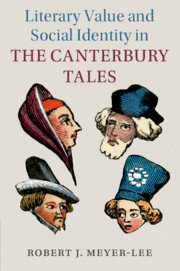Book contents
- Literary Value and Social Identity in the Canterbury Tales
- Cambridge Studies in Medieval Literature
- Literary Value and Social Identity in the Canterbury Tales
- Copyright page
- Dedication
- Contents
- Acknowledgments
- Abbreviations
- Introduction
- Chapter 1 Clerk
- Chapter 2 Merchant
- Chapter 3 Squire
- Chapter 4 Franklin
- Notes
- Works Cited
- Index
- Cambridge Studies in Medieval Literature
Chapter 1 - Clerk
Published online by Cambridge University Press: 15 October 2019
- Literary Value and Social Identity in the Canterbury Tales
- Cambridge Studies in Medieval Literature
- Literary Value and Social Identity in the Canterbury Tales
- Copyright page
- Dedication
- Contents
- Acknowledgments
- Abbreviations
- Introduction
- Chapter 1 Clerk
- Chapter 2 Merchant
- Chapter 3 Squire
- Chapter 4 Franklin
- Notes
- Works Cited
- Index
- Cambridge Studies in Medieval Literature
Summary
Chapter 1 argues that the Clerk’s performance, like Chaucer’s earlier House of Fame, presents an array of different and even contradictory conceptions of literary value in order to give Chaucer’s fiction the distinctive meta-value of standing above any one commitment to literary value, playfully and provocatively assessing competing options, and thereby positioning the implied author as a master of the literary game. For the House of Fame this sort of meta-value serves the purpose of imagining the social identity of customs controller as a legitimate and distinctive locus for poetic composition. In the Clerk’s performance Chaucer imagines the university student as a normative masculine occupation for which meta-axiology is an end in itself, and thereby gives his earlier position a more authoritative and traditional institutional home. To pursue this argument, the chapter considers the House of Fame; select features of the Clerk’s prologue, tale, and epilogue, for the tale focusing on specific wording in light of its Petrarchan source; and the Clerk’s portrait, placing it against the backdrop of what we know about the normative function of the university in Chaucer’s day.
Keywords
- Type
- Chapter
- Information
- Publisher: Cambridge University PressPrint publication year: 2019

